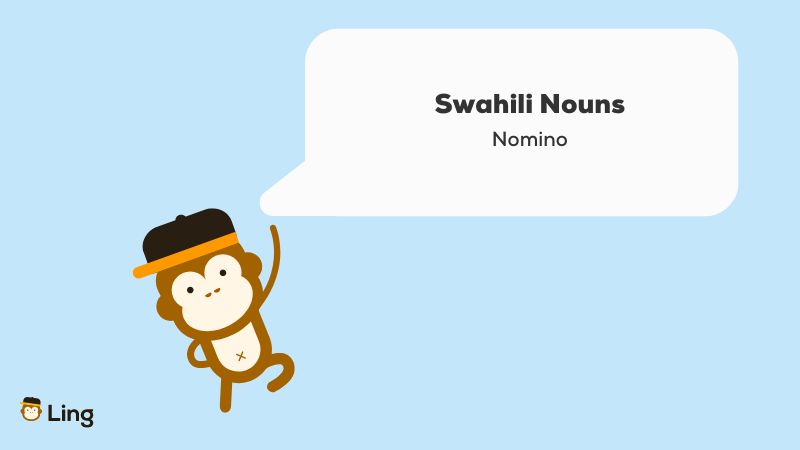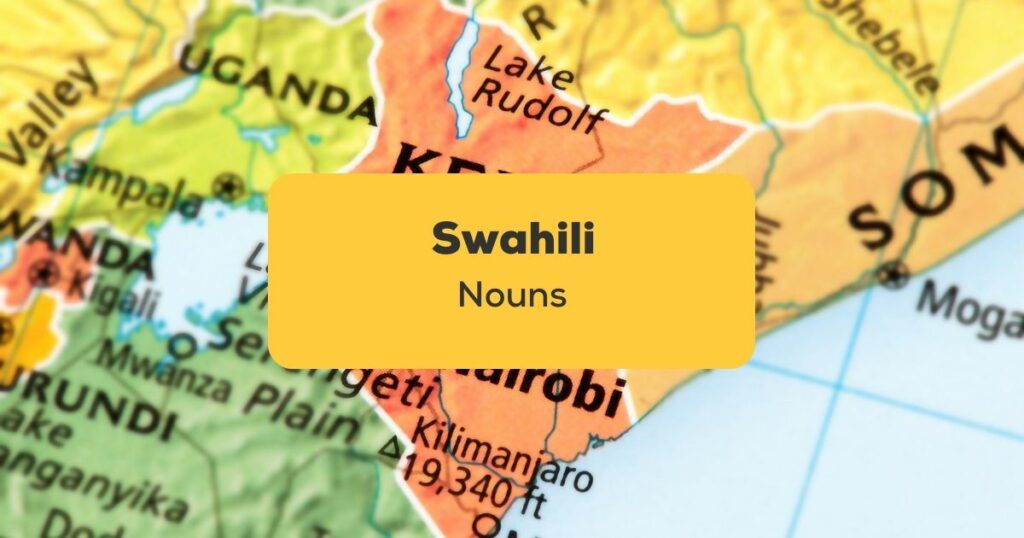Swahili, a Bantu language spoken widely across East Africa, is renowned for its rich linguistic structure and cultural significance. A fundamental aspect of Swahili grammar is how they classify nouns, which make the core of Swahili’s sentence construction because they convey essential information about what is being discussed. Understanding Swahili nouns or ‘Nomino‘ is key to unlocking the language’s intricacies which will help you to effectively communicate with its speakers.
In Swahili, nouns are far more than just words; they carry grammatical gender, class, and plurality distinctions that influence how they are used in sentences. These characteristics fill Swahili with a unique flavor and give deep insights into the worldview of the communities that have nurtured the language for centuries. The system of noun classes, present in many Bantu languages, is a unique feature that sets Swahili apart and cannot be overlooked.
Today’s exploration into Swahili nouns will uncover the ways in which they interact with verbs, adjectives, and other grammatical elements, shedding light on how Swahili speakers create meaningful and contextually rich expressions. Whether you’re a linguistics enthusiast, a traveler eager to connect with East African cultures, or a language learner seeking a new challenge, grasping the essence of Swahili nouns is an essential step on your journey. Let’s embark on this linguistic adventure and unravel the captivating world of Swahili nouns together. Welcome, or as they say Karibu!

Swahili Noun Classes
Prefixes and suffixes together are like the bookends of a word – they help it stand strong and tell a complete story in a sentence. When you use a word in Swahili, the noun class prefix at the beginning of the word tells you what kind of thing that word is – a person, a thing, a place, and so on. Just like in English, when you add “-ing” to a verb to make it a “doing” word, Swahili adds these prefixes to make sure everything fits right in a sentence.
In other words, you will find noun class prefixes indicate that this word is a noun, plus it will also help you understand if it is singular or plural form. Let’s take a look at this clearly in the table below.
The following outlines several examples of key Swahili noun classes.
| Noun Class | Use | Singular Noun (Swahili) | English | Plural Noun (Swahili) | English |
|---|---|---|---|---|---|
| M-wa Class | Refers to people and some animate objects | m-, mw- | wa-, w- | ||
| Mtu Mwanafunzi | Person Student | Watu Wanafunzi | People Students | ||
| M-mi Class | Refers to inanimate objects, plants, body parts, and natural phenomena | m-, mw- | mi-, my- | ||
| Mti Mwaka | Tree Year | Miti Miaka | Trees Years | ||
| Ji-ma Class | Refers to various items, fruits, and collectives | ji-, j-, no prefix | ma-, m- | ||
| Jicho Jino Jimboni | Eye Tooth Province | Macho Meno Majimbo | Eyes Teeth Provinces | ||
| Ki-vi Class | Refers to artifacts, tools, and objects manufactured by people | ki-, ch- | vi-, vy- | ||
| Kiatu Chombo | Shoe Vessel | Viatu Vyombo | Shoes Vessels | ||
| N Class | Refers to a wide range of items, both animate and inanimate. Many words are loanwords from other languages | n-, ny-, m-, no prefix | n-, ny-, m-, no prefix | ||
| Baiskeli Kahawa Simba | Bicycle Coffee Lion | (Same in plural form) | |||
| U Class | Refers to countable and uncountable nouns, qualities, abstractions, and collectives | u-, w-, uw- | n-, ma- (for uncountable nouns) | ||
| Utata Wakati Uwongo | Complication Time A lie | ||||
| Ku Class | Forms verbal nouns, equivalent to infinitives or gerunds | ku-, kw- | (same) | ||
| Kusoma | Reading | ||||
| Pa Locative | Denotes definite locatives | pa- | (same) | ||
| Kabati | Cupboard | ||||
| Mu Locative Class | Denotes locatives within the confines of a noun | mu-, m- | (same) | ||
| Mwili Miji | Body Towns |
This comprehensive word breakdown provides a deeper understanding of how Swahili nouns are classified and how their associated prefixes influence the language’s structure and usage. It’s a valuable resource for anyone interested in learning or studying the Swahili language and grammar.

Why A Noun Class System?
Noun classes are used in Swahili to organize and categorize words in a way that helps people understand how they relate to each other in sentences. Think of noun classes like sorting your clothes into different places in the closet based on what they are. This sorting helps you find things easily and know how to put an outfit together.
Swahili has many different types of words, like people, animals, things, places, and more. Noun classes help put similar words into the same group, so when you talk or write, you know which words go together. This makes sentences clear and makes it easier for others to understand you.
Noun classes are a helpful tool that makes Swahili sentences organized, understandable, and consistent. They’re a bit like puzzle pieces that fit together to create a complete picture in the language!

Swahili Nouns In Sentences
Using all these different nouns you’ve seen above with their given class can be challenging. Let’s try using them in their different classes in sentences rather than looking at them as individual words. Hopefully, you can distinguish the different ways they are used!
| English | Swahili Nouns In Sentences |
|---|---|
| The student is studying. | Mwanafunzi anasoma. |
| The book has a lot of knowledge. | Kitabu kina maarifa mengi. |
| In the province, there is a large park. | Jimboni kuna mbuga kubwa. |
| The bird is flying up. | Ndege anaruka juu. |
| When it rains, people run. | Panapotokea mvua, watu wanakimbia. |
| Thinking can be difficult. | Kufikiri kunaweza kuwa ngumu. |
| The behavior of society is changing. | Mwenendo wa jamii unabadilika. |
| The leather belt is strong. | Ukanda wa ngozi una nguvu. |

Ling For Swahili
Practice certainly helps to learn a new noun, vocabulary, meaning, and pronunciation but everyone needs some sort of help along the way. As they say, two heads are always better than one – it helps you think better! So how about having the best language learning companion, the Ling app, accompany you?
This gamified app with its interactive exercises and deep understanding of grammar as well as learning with fun will help you cruise through learning Swahili noun classes, verb conjugation, grammatical gender, and even moods and emotions! The Swahili blog takes you on a tour of East African countries with so much cultural and language information.
In fact, just to get a taste of what it’s about, download the Ling app for your iOS or Android devices and see for yourself! There is a free trial period, so you have nothing to lose! Try the first lesson and watch your Swahili listening, speaking, reading, and writing skills improve with Ling’s unique approach to languages. Begin today!































































